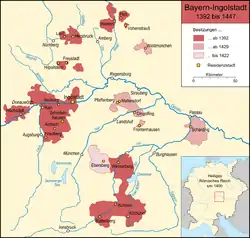Bavaria-Ingolstadt Teilherzogtum Bayern-Ingolstadt | |||||||||
|---|---|---|---|---|---|---|---|---|---|
| 1392–1447 | |||||||||
 The Duchy of Bavaria-Ingolstadt (1392–1447) | |||||||||
| Status | Duchy | ||||||||
| Capital | Ingolstadt | ||||||||
| Government | Monarchy | ||||||||
| Duke of Bavaria-Ingolstadt | |||||||||
• 1392–1413 | Stephan III | ||||||||
• 1413–1447 | Louis VII | ||||||||
• 1443–1445 | Louis VIII | ||||||||
| Historical era | Middle Ages | ||||||||
• Division of Bavaria-Landshut | 1392 | ||||||||
| 1443 | |||||||||
• Annexed by Bavaria-Landshut | 1447 | ||||||||
| |||||||||
Bavaria-Ingolstadt (German: Bayern-Ingolstadt or Oberbayern-Ingolstadt) was a duchy which was part of the Holy Roman Empire from 1392 to 1447.[1]
History
After the death of Stephen II in 1375, his sons Stephen III, Frederick, and John II jointly ruled Bavaria-Landshut. After seventeen years, the brothers decided to formally divide their inheritance. John received Bavaria-Munich, Stephen received Bavaria-Ingolstadt, while Frederick kept what remained of Bavaria-Landshut.
After Stephen's death in 1413, Louis VII assumed his father's throne. In 1429 parts of Bavaria-Straubing were united with Bavaria-Ingolstadt. Louis reigned until his own son, Louis VIII, usurped his throne in 1443 and delivered him to their enemy, Henry XVI, duke of Bavaria-Landshut. Louis VIII died two years later. Louis VII died in captivity. With no heir, Bavaria-Ingolstadt was returned to Bavaria-Landshut.[2]
Geography
Bavaria-Ingolstadt was cobbled together from diverse, non-contiguous territories in Bavaria. The capital was Ingolstadt and included the territories around it: Schrobenhausen, Aichach, Friedberg, Rain am Lech and Höchstädt an der Donau. In addition, Bavaria Ingolstadt incorporated the following towns:
Southern Bavaria:
Eastern Bavaria:
Northern Bavaria:
References
- ↑ Anderson, Emily-Jan; Farquhar, Jill; Richards, John (2020-05-15). Visible Exports / Imports: New Research on Medieval and Renaissance European Art and Culture. Cambridge Scholars Publishing. pp. 239–240. ISBN 978-1-5275-5181-7.
- ↑ KG, Fritz Rudolf Künker GmbH & Co. Künker Auktion 130 - The De Wit Collection of Medieval Coins, 1000 Years of European Coinage, Part II: Germany, Switzerland, Austria, Bohemia, Moravia, Hungary, Silesia, Poland, Baltic States, Russia and the golden Horde. Numismatischer Verlag Künker. pp. 331–332.